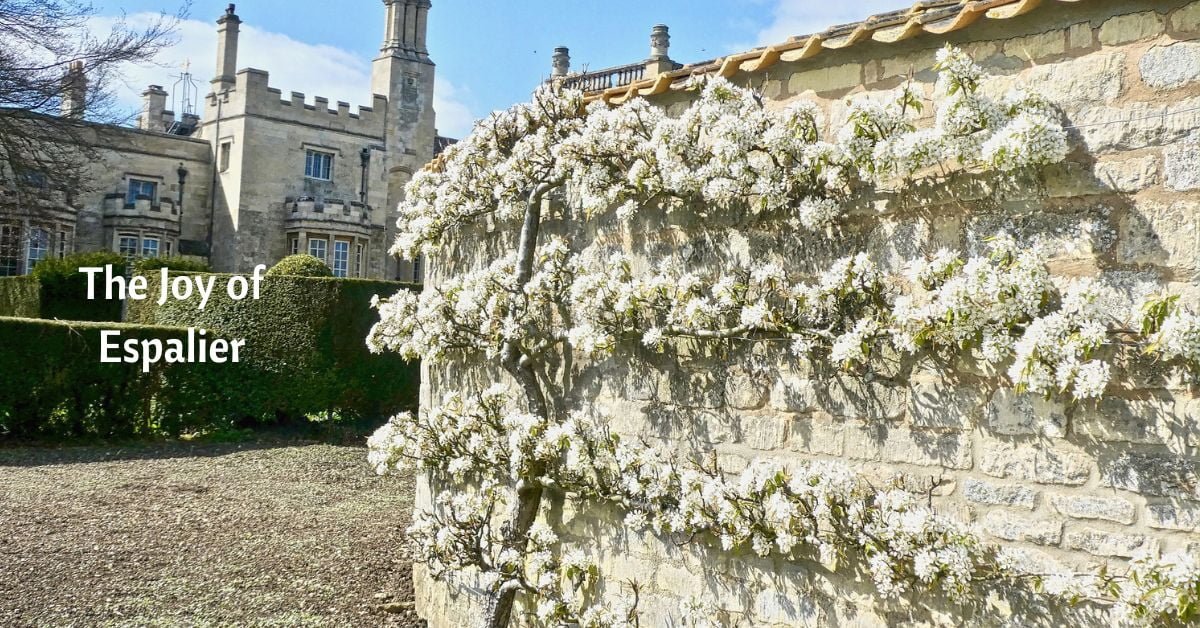In the world of horticulture, the practice of training trees into intricate, flat shapes against a support structure is called “espalier.” This ancient horticultural art has grown in popularity in recent years. It not only adds a touch of elegance to your yard but also maximizes space and offers unique gardening challenges and rewards.
What is Espalier?
Espalier is a technique that involves training trees to grow in a two-dimensional plane, often against a wall, fence, or trellis. This method originated in medieval Europe.
It was admired for its aesthetic appeal but also for its practicality in optimizing space in constrained areas like walled gardens. Over the centuries, the tradition has endured, and today, espalier trees can be found gracing gardens, courtyards, and even urban spaces.
Appropriate Locations for Espalier Trees
Espalier trees are versatile and can thrive in various settings, but they are particularly well-suited for spaces with limited room. Urban gardens, small courtyards, and even balconies can benefit from the space-saving nature of espalier.
They are an excellent choice for regions with a mild climate, although certain hardy varieties can withstand colder temperatures.
Choosing the Right Trees
Selecting the right type of tree for espalier is crucial for success. Common choices include apple, pear, peach, and citrus trees due to their flexibility and adaptability to this unique growing method. That doesn’t mean only fruit trees can be used, though; Japanese maple and firethorn are also great options.
Deciduous trees are generally preferred over evergreens, as they respond better to pruning and shaping.
Pros of Adding Espalier Trees to Your Yard
Here are some of the advantages of growing espalier trees in your garden or yard:
Space Optimization
One of the primary advantages of espalier is its ability to maximize limited space. The flat, two-dimensional growth allows for creative placement against walls or fences, making it ideal for limited space.
Aesthetic Appeal
Espalier trees offer a touch of sophistication to any landscape. The carefully trained branches and the geometric patterns they create can turn a simple garden into a work of art.
Fruit Production
Many trees suitable for espalier are fruit-bearing. This makes them not only visually pleasing but also functional, providing a harvest of delicious fruits in a controlled and easily accessible manner.
Privacy and Screening
When strategically placed, espalier trees can act as natural barriers, providing privacy and screening. This is particularly useful for urban gardens or homes with close neighbors.
Cons of Adding Espalier Trees to Your Yard:
Espalier trees offer a stunning visual appeal, but they require a dedicated and patient gardener. That can be one of the difficulties of growing them. Here are some cautions to keep in mind when starting:
Skill and Patience Required
Successful espalier requires time, patience, and a certain level of horticultural skill. The intricate pruning and training can be intimidating for beginners. Mistakes can impact the overall health and appearance of the tree.
Limited Fruit Production
While many espalier trees do bear fruit, the overall yield might be less compared to traditionally grown trees. The focus on form and structure can sometimes compromise the quantity of fruit produced.
Climate Sensitivity
Espalier trees, particularly deciduous ones, may be sensitive to extreme weather conditions. Harsh winters or scorching summers can pose challenges, and selecting the right tree for your specific climate is crucial.
Long-Term Commitment
Espalier is not a one-time task but an ongoing commitment. Regular pruning and maintenance are necessary to preserve the shape and health of the tree. This might be daunting for individuals with a more laid-back approach to gardening.
In the intricate world of gardening, espalier trees stand out as both an art form and a practical solution for space-conscious enthusiasts. Their cultivation demands dedication and skill, but the rewards—both visual and functional—make the effort worthwhile. Great for a small backyard or an urban balcony, espalier trees offer a unique and timeless charm to any landscape!









